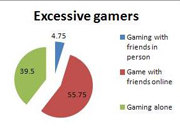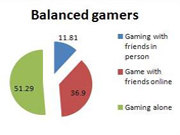Aussie study finds link between excessive gaming and anxiety
Preliminary results from Victoria University study reveal those who spend more than 30 hours a week playing games have higher levels of stress and anxiety.
Last November, Victorian Ph.D. student Daniel Loton put the call out for participants in an ongoing global study into the long-term effects of video game addiction. The first wave of preliminary results from that study--conducted by Loton and Victoria University--have now revealed that excessive video game playing is associated with higher levels of anxiety and depression.
In the first wave of the study, Loton surveyed just over 100 participants over a nine-month period to measure variables such as stressful events and life satisfaction, as well as things like parenting, working, studying, and romantic relationships. Participants were asked to complete regular diary entries to measure how games impact various aspects of their life.
The study's preliminary results compared the answers of excessive gamers (those who admitted to spending more than 33 hours on average a week playing video games) with those of more casual players (21 hours on average a week playing video games). The excessive gamer group--made up of around 30 participants--reported 15 per cent more stress and anxiety and 25 per cent more depression than the casual players group.
"Both groups averaged levels of stress, anxiety, and depression well above norms reported in past studies," Loton said. "But most alarming was that excessive gamers scored more than half the maximum measure for each and enough to determine clinical significance."
However, Loton's study revealed that excessive gaming did not negatively impact success or satisfaction at work or study. According to the study, excessive players showed marginally higher success in their studies, failing fewer subjects and scoring higher grade averages than they had intended.
Loton says that while the preliminary results of the study do show a link between excessive video game play and lower mental health, further analysis is needed to determine the severity of the problems identified.
The study is ongoing and requires more participants. To take part, visit the official site.
Participation involves completing online surveys monthly for a short period, and all participants who complete the study go into the draw to win A$500.
Got a news tip or want to contact us directly? Email news@gamespot.com


Join the conversation